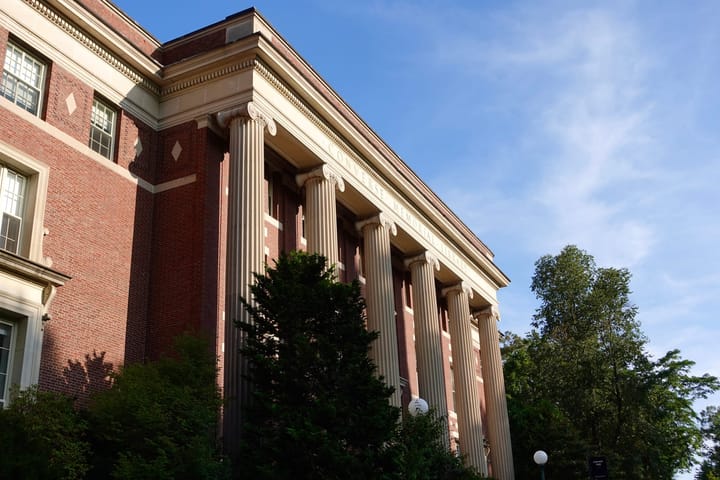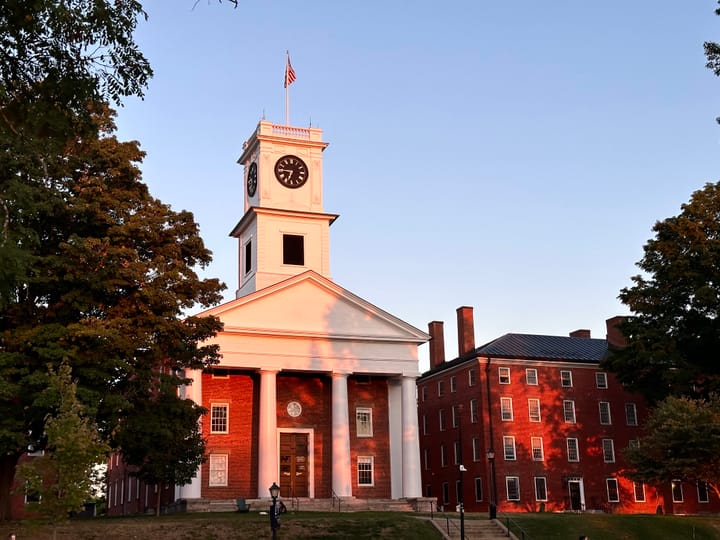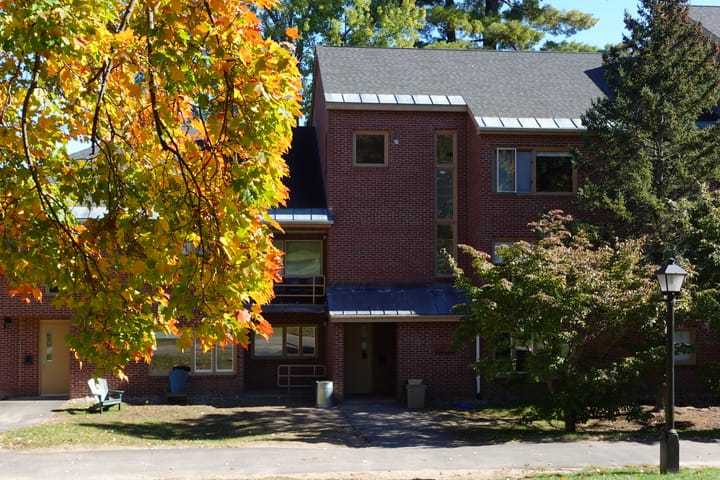Staff Spotlight: Maria Grove
In this edition of Staff Spotlight, Staff Writer Gabby Miller ’29 spoke with Development Coordinator for the Office of Student Engagement and Leadership Maria Grove about where she grew up, her role at the college, and what it means to be a leader.

Q: Could you share a little about yourself and your role on the Amherst campus?
A: I am the student leadership development coordinator for the Office of Student Engagement and Leadership. I oversee the Mammoth Leadership Academy. I’m from Miami. I moved to [Western Massachusetts] about four years ago, and have a big passion for leadership development and helping our students become the best versions of themselves. I think that our students here at Amherst College are very unique and very interesting … I love learning about their journeys and what leadership development means [to] them. I like puzzles, and I like thinking about the complexity of humans, and how we can all come together to learn from each other.
Q: You said you were from Miami. What’s the biggest difference between Miami and Amherst, besides the weather?
A: I was born and raised in Miami. My family’s all from Central America or Nicaragua. There’s a big Nicaraguan population in Miami. And I always joke with people that although I grew up in Miami, it did feel sometimes like I grew up in Nicaragua, because every corner there was somebody that looked like me, sounded like me, ate the same food as me, and I would say that’s been the biggest difference here [at Amherst].
Q: What was your journey to Amherst like? What roles have you held in the past?
A: I’ve been blessed in many different ways. I played soccer in college [at Saint Thomas University]. I was the captain of my team, and I started to focus on what leadership meant — and for me, it started to be about relationship management and how to get my team to succeed while I was on the bench. I started getting involved a lot on campus and got my master’s degree in ethical leadership. Once I graduated [with] my master’s, I was offered a faculty position to teach, which is really unheard of when you’re 21. I was teaching leadership to undergrad students, [the] majority [of which were] first- and second-year students. I did that for two years, and I really did enjoy meeting [and] talking to students [about] what leadership means to them.
After that, we moved up here to Western [Massachusetts]. I was a director of student athlete development at [the University of Massachusetts, Amherst] (UMass). I oversaw their leadership academy, which I launched once I got over there. It’s called the BeyondU Leadership Academy, which is for all the athletes. I oversaw the community service, their [diversity, equity, and inclusion] pillars, [and] mental health for around 700 student athletes. I was always interested in Amherst College, and when I saw this role open, I wanted to know more about it and how perhaps I could take what I built at UMass with their leadership academy and do it at a larger scale. And that’s exactly what happened. [I] came over to Amherst College about a year and a couple [of] months ago. My goal when I got here was to build a program of leadership, [so] that students can enhance their skill sets in whatever capacity, whether it’s the captain of a sports team or somebody in their research lab learning to lead.
Q: You mentioned you played college soccer. What advice would you give to Amherst student-athletes on becoming a leader on their team?
A: Yeah, that’s a good question. I think leadership means different things for every single person, and I think that there is not a one-size-fits-all model of the type of leader that we want you to look like or sound like or be like. I think the best piece of advice is to think about [a couple of questions]. What does the best version of yourself look like? How can you impact others while you’re getting there? How can you invite others to the table and set a standard of excellence? What’s your relationship management style? How are you impacting others? How are you being thoughtful? How are you helping the ones who aren’t speaking as well as creating an inclusive environment? But I would say that for student-athletes, leadership means differently [to you] than what it means for the person to the right or to the left of you. That’s what I would encourage you most to think about: the type of person that you want to be, the legacy that you want to leave, and the person that you want to be known for to impact those around you.
Q: What is a typical day like for you?
A: Apart from my full-time job here, I also have two other jobs. I am the director of a program called Morning Movement and Mentorship, which is a program at Amherst [Regional] Middle School and [Amherst Regional] High School that helps students [who] need a little bit more assistance before school. This program runs [from] 7 to 8:30 a.m. every Monday, Tuesday, [and] Wednesday. We have mentors from Amherst College, from UMass, and we have local community members [who] are helping us out. We have about 50 students [who] come in every day.
I think my day-to-day is different every single day, but [the] majority is spent building relationships. I think one thing that students know about me is that I’m very focused on how I can make every student at Amherst feel special. I think that sometimes that can be hard in a place where you know you’re used to being the best where you come from and you come to a place where everybody’s the best of the best. So, how can I make [students] feel special? I think that that’s the way I lead when I walk into the door at Amherst, making folks feel special, whether it’s remembering your name or it’s remembering a moment that I shared with you.
Then there’s also the part of my day-to-day [spent] running the Mammoth Leadership Academy. The Mammoth Leadership Academy is a program that essentially offers leadership development to our students. We have our cohort, and then we have open sessions. Open sessions are for students who aren’t available to commit to an entire semester of a cohort but still want to get leadership development skills. So it’s a lot of the planning and the behind-the-scenes of what’s going to make the most sense, also listening to students, [and] hearing what are the themes that we’re seeing on campus. How can I use that to tie it to the themes that we’re going to learn throughout our academy? I can bring in a speaker, or I can lead a session on conflict resolution or emotional intelligence.
Q: What is your favorite part of your job?
A: I think my favorite part is lunch, because I like eating, and then also students like to come and hang out in [my office] during lunch, and I love that. I love hearing about their days and what’s their new gossip, or what’s their new chemistry test on. I love just supporting them on their journey. I think one unique thing about Amherst since we’re a residential campus, [is that] our students really embrace us as their family, and that’s something that I don’t take lightly. I see them all as an extension of my family. And family always, always [is] there for each other through the good and the bad.
Q: What do you hope students take away from the Academy?
A: I have a couple. I think community is one of them. I want our students to walk away knowing that there’s a community that supports them. Our spring cohort had 30 students in it, so you have a new family of 30 students who are uplifting you, are supporting you in your journey of self-discovery, and your journey of becoming the best version of yourself as a leader. I think the second thing I want them to learn is their leadership style. I want them to know that we are all very different, and that is okay. There are quiet leaders [and] there are loud leaders, but there [are] also leaders who challenge the norms of what we’ve seen on TV or in the sports scene or in the social scene. I always tell everybody, you’re one of one, and we can’t replace you, and you need to remember that and embrace that. You don’t need to be anybody else. We can always be better, but the better versions of ourselves, not the better versions of [other people].
Q: Do you have any advice for students thinking of applying to the Mammoth Leadership Academy next semester?
A: I would say apply. A lot of students say or think, "my resume isn’t 10 pages long, so I don’t think that I’m a qualified leader." I disagree with that. I think that leadership, for me, it’s a lot about you genuinely wanting to learn. So if you are a person [who] genuinely wants to learn, [who] genuinely wants to be engaged in conversations that may challenge you, and if you’re someone [who] really wants to connect with different folks on campus, I would encourage you to apply. I think that you would be surprised [with] what you can do when you just show up. You don’t always have to be the best in the room. Just show up and be there, and along the way, you’ll find the right fit for you and exactly where you need to be.





Comments ()